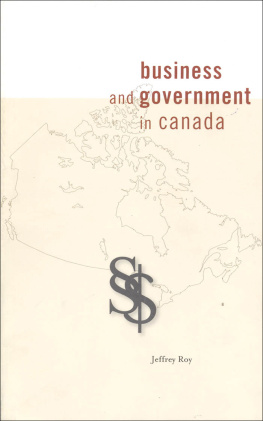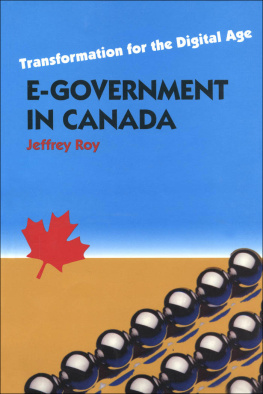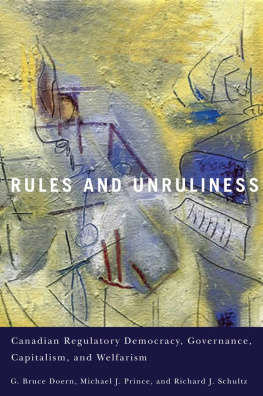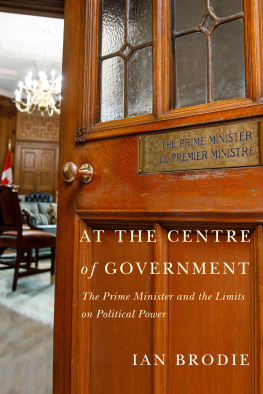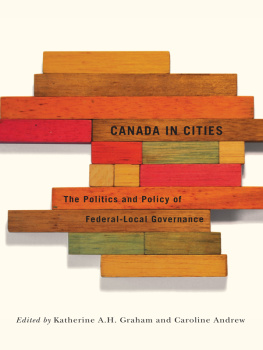business
and government
in Canada
GOVERNANCE SERIES |
Governance is the process of effective coordination whereby an organization or a system guides itself when resources, power, and information are widely distributed. Studying governance means probing the pattern of rights and obligations that underpins organizations and social systems; understanding how they coordinate their parallel activities and maintain their coherence; exploring the sources of dysfunction; and suggesting ways to redesign organizations whose governance is in need of repair. The Series welcomes a range of contributionsfrom conceptual and theoretical reflections, ethnographic and case studies, and proceedings of conferences and symposia, to works of a very practical naturethat deal with problems or issues on the governance front. The Series publishes works both in French and in English. |
The Governance Series is part of the publications division of the Program on Governance and Public Management at the School of Political Studies. Nine volumes have previously been published within this series. The Program on Governance and Public Management also publishes electronic journals: the quarterly www.optimumonline.ca and the biannual www.revuegouvernance.ca Editorial Committee Caroline Andrew
Linda Cardinal
Monica Gattinger
Luc Juillet
Daniel Lane
Gilles Paquet (Director) |
business
and government
in Canada
Jeffrey Roy
University of Ottawa Press 2007
All rights reserved. No parts of this publication may be reproduced, stored
in a retrieval system or transmitted in any form or by any means, electronic
or mechanical, including photocopy, recording, or otherwise, without
permission in writing from the publisher.
NATIONAL LIBRARY OF CANADA CATALOGUING IN PUBLICATION
Roy, Jeffrey
Business and government in Canada / Jeffrey Roy.
(Governance series)
Includes bibliographical references and index.
ISBN 978-0-7766-0658-3
1. Industrial policyCanada. 2. Business and politicsCanada.
I. Title. II. Series: Governance series (Ottawa, Ont.)
HD3616.C32R69 2007 322.30971 C2007-903948-0
Published by the University of Ottawa Press, 2007
542 King Edward Avenue
Ottawa, Ontario KIN 6N5
www.uopress.uottawa.ca
The University of Ottawa Press acknowledges with gratitude the support extended to its publishing list by Heritage Canada through its Book Publishing Industry Development Program, by the Canada Council for the Arts, by the Canadian Federation for the Humanities and Social Sciences through its Aid to Scholarly Publications Program, by the Social Sciences and Humanities Research Council, and by the University of Ottawa. We also gratefully acknowledge the Center on Governance at the University of Ottawa whose financial support has contributed to the publication of this book.
PREFACE
The purpose of this short book is to engage students in a dialogue on the importance of interactions and interrelations between government and business. Although most countries in the world now embrace good governance as a central tenet of development and prosperity, many tensions and choices remain. Even as most countries readily accept the importance of collaboration between the public and private sectors, many risks and diverging interests remain. In short, while the ideology of governance is less polarized than in recent decades, the conduct and design of sectoral relations are both more strategic and more nuanced and, arguably, more interesting as a result.
It is this challenge of conducting and designing governance in ways that transcend or enjoin business and government that is the central focus of this book. Three divergent yet complementary perspectives on the relational nexus between these sectors serve as a platform. The perspectives have been developed by three leading Canadian scholars in their fields, all of whom have contributed to my own learning on the topics at hand. My biases are no doubt exposed as the book progresses, due in no small measure to my good fortune in having apprenticed directly with one member of this eminent group.
Indeed, this book stems from the importance and enjoyment of teaching government-business relations in management programs oriented to either business or government managers or aspirantsor, in the best of all worlds, a mixing of these groups. All too often academic specialization creates a false dichotomy between the public and private realms, resulting in missed opportunities for students and diminished capacities for collaborative innovation and learning for the country as a whole.
Fortunately, over the past decade, I have been blessed with the opportunity to try to bridge this cognitive gap with both undergraduate and graduate students alike. It is my hope that our classroom discussions, from which I have benefited tremendously, have also served them well by providing some of the tools necessary for sound navigation in todays environment of complexity and change; it is to them that I dedicate this book with gratitude for so many rewarding moments of shared learning. A note of thanks must also be extended to colleagues and reviewers of early drafts of this text as well as to the highly competent editing and production team at the University of Ottawa Press. Despite their best efforts, all errors and omissions are solely my responsibility.
INTRODUCTION
This book examines five of the most critical thematic challenges confronting business and government in Canada, both separately and collectively, in todays increasingly networked governance environment. The five challenges, explained more fully below, are corporate governance, lobbying and influence, security and privacy, public-private partnerships, and geography and development. Underpinning all of these challenges is the following premise: the boundaries between business and government are increasingly fluid and often transcended. Yet it remains important to both acknowledge and make the appropriate usage of the fundamental differences between each sector, which dictate the need for boundaries in the first place.
Established and maintained for different purposes, each sector features a unique set of structures and cultures that reflects its broad purpose and contribution to the stability and collective fortunes of a particular jurisdiction, most often but not exclusively a country. For government, this uniqueness stems from the pursuit of objectives and outcomes deemed to be in the public interest Typically, the public interest is defined as a collective agenda, involving various forms of actions or services that impact all members of a jurisdiction. Accountable to the citizenry as a whole, the public sector is a political arena in which competing interests clash and are then reconciled through mechanisms overseen by elected officialsacting as representatives of the people.
Business, by contrast, is driven by a private interest of the owners of capital who have invested resources in an enterprise seeking to create and exploit opportunities in a competitive marketplace. Generating an economic return (a surplus or profit) is not only the primary objective but also the basis of sustaining what is ultimately a choice by owners to commit to operating their enterprise. Unlike the typically broad scope of government, businesses or companies can serve a very narrow customer base, although today the expansion of markets both within and beyond national borders affords greater opportunities for growth and diversification as well.

